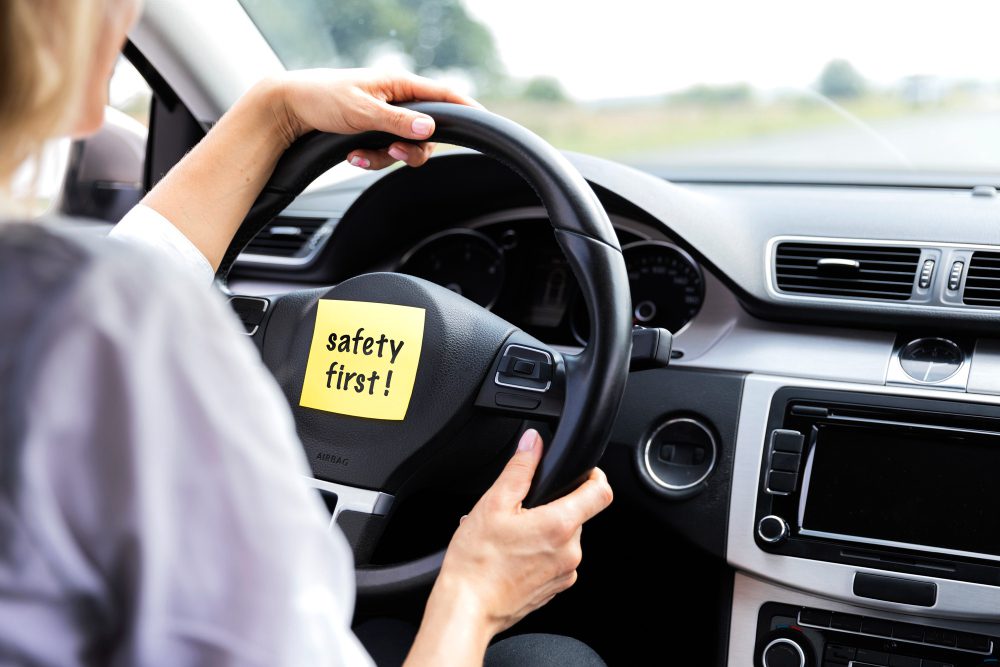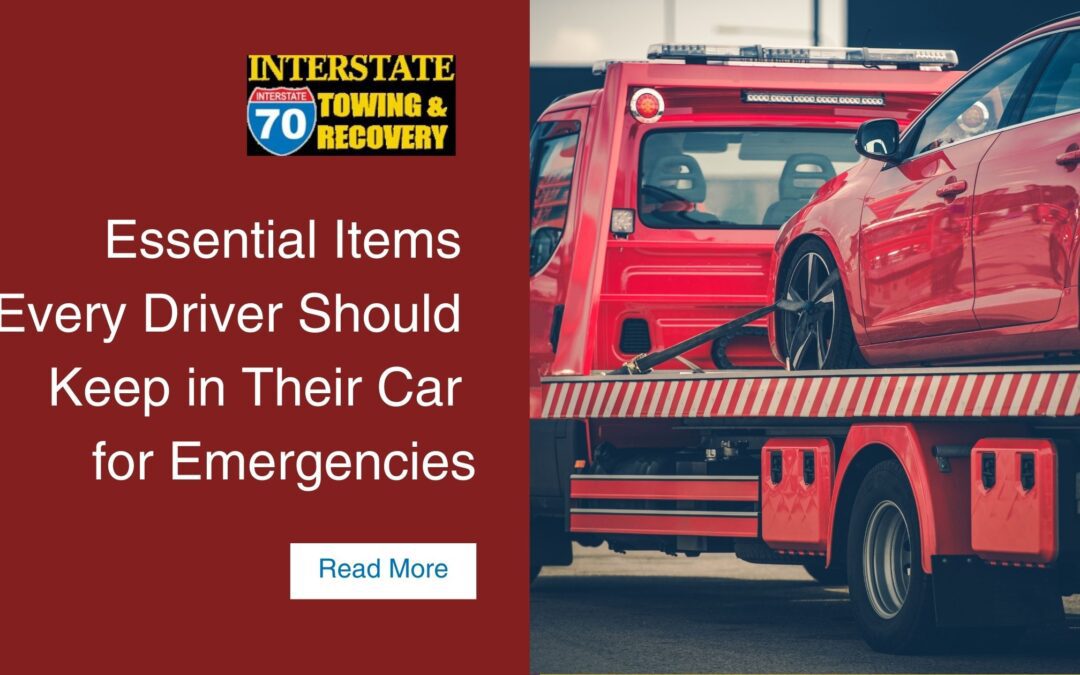- A well-stocked car emergency kit provides safety, comfort, and peace of mind during breakdowns or delays.
- Emergency tools, seasonal gear, and communication backups help drivers stay prepared in any situation.
- Interstate 70 Towing & Recovery offers dependable support when emergencies go beyond what your kit can handle.
Being on the road brings a certain freedom that’s hard to match. Whether it’s a quick commute, a long drive to visit loved ones, or a weekend getaway, there’s something empowering about getting behind the wheel. But as freeing as driving can be, it also comes with responsibilities, and one of the most important is being prepared for the unexpected.
No one sets out on a trip thinking they’ll have car trouble. But the reality is that breakdowns, accidents, and weather delays can happen to anyone, no matter how reliable the vehicle or how short the journey. That’s why keeping essential emergency items in your car isn’t just a precaution—it’s a way to take care of yourself, your passengers, and anyone who may need your help.
Emergencies don’t need to be dramatic to be disruptive. A flat tire in the rain, a drained battery in a parking lot, or heavy snow that leaves you stranded for an hour—all of these are common situations where having the right tools on hand makes things safer and more manageable. And even though professional help, like towing services, is often available, the time between trouble and assistance matters. Being prepared helps bridge that gap.
Let’s take a look at what truly belongs in your vehicle and how each item plays a role in helping you stay safe, calm, and confident when things don’t go as planned.
Preparedness Is a Form of Care
Keeping an emergency kit in your car isn’t about expecting disaster—it’s about having compassion for your future self. It’s a way to say, “I’ve got your back,” when plans change suddenly or the weather takes a turn. A well-stocked kit can’t solve every problem, but it gives you the tools to handle the moment with confidence.
You might not use everything in your kit often. In fact, you may go months—or years—without needing it. But when you do, you’ll be grateful you took the time to prepare. Emergencies can be stressful, but they don’t have to be overwhelming. When you have the right items nearby, you’re not just waiting for help—you’re actively taking steps to keep yourself safe and comfortable.
It’s also worth remembering that your emergency kit isn’t just for you. If you travel with family, friends, or even pets, your preparedness helps care for them too. And sometimes, it might be another driver who needs a helping hand. Being prepared puts you in a position to offer kindness when it’s needed most.
Essential Safety and Survival Items
When your car has trouble, your safety is always the top priority. That’s why certain emergency items are essential, no matter where you live or drive. These basics help ensure that if you’re stuck, especially in the dark or in poor weather, you’re protected while you wait.
One of the most important items to keep in your car is a thermal blanket. These space-saving blankets help preserve body heat and are incredibly helpful during cold weather. Alongside that, keep a rain poncho and a spare set of gloves and socks. Staying warm and dry reduces the risk of hypothermia and helps you stay clear-headed if you need to wait or change a tire.
Another vital item is a flashlight with extra batteries. Even in familiar areas, things look different at night. A strong beam of light helps you assess the situation, stay visible, and move around safely. It also helps signal to others that you need assistance.
Visibility matters more than most people realize. If your car is disabled on the side of the road, reflective triangles or road flares can alert oncoming traffic and help prevent further accidents. These simple tools can keep both you and others safe, especially when visibility is low.
If you have space, keep a small first aid kit on hand. Cuts, scrapes, or minor injuries are easier to manage when you’re prepared. Include bandages, antiseptic wipes, tweezers, pain relievers, and any critical medications that someone in your family may need.
Tools That Can Make a Difference
There’s a unique peace of mind that comes from knowing you can handle a few minor roadside issues yourself. You don’t need to be a mechanic, but having a few simple tools can save time, money, and stress.
A portable jump starter is one of the most useful tools a driver can carry. Car batteries can lose charge for many reasons—cold weather, a forgotten dome light, or even a loose connection. A jump starter lets you power up your vehicle without waiting for another car to come by. It’s fast, safe, and especially helpful in parking lots or remote areas.
Tire trouble is another common issue. If you don’t feel confident changing a tire, that’s okay—many people don’t. But having a tire inflator or sealant on hand can often get you safely to a repair shop. These tools are especially helpful for slow leaks or minor punctures that don’t require immediate replacement.
Keep a small toolkit in your trunk. It doesn’t need to be complicated—a screwdriver, pliers, and an adjustable wrench can be surprisingly useful. Even something as simple as duct tape and zip ties can offer a temporary fix for loose parts or leaky hoses until you can reach a mechanic.
These tools are about helping you respond, not replace professional help. Sometimes, you just need a way to get to a safer location—and that’s where a well-equipped trunk makes a big difference.
Communication Tools for Peace of Mind
When something goes wrong, the first instinct is usually to reach for your phone. That’s why it’s so important to keep a car charger or portable power bank in your vehicle. Whether you’re calling a friend or contacting a towing service, a charged phone keeps you connected and informed.
It’s also helpful to keep a written list of emergency contacts in your glove box. If your phone is lost or not working, you’ll still have the numbers you need. Include your towing service, insurance provider, a trusted mechanic, and a friend or family member.

If you travel through rural areas or places with weak signals, a paper map can be surprisingly helpful. GPS is convenient, but it isn’t always reliable. Having a backup map shows just how thoughtful your emergency planning is.
Another overlooked item? A pen and a notepad. If you’re in a minor accident, you may need to record license plate numbers, take notes, or write instructions. It’s a small addition that can make things easier during an already stressful moment.
Basic Comfort and Care Essentials
Emergencies can sometimes take a while to resolve. Whether you’re waiting for a tow truck or riding out a weather delay, staying hydrated and nourished is essential.
Keep bottled water in your car at all times. Aim for at least one bottle per person who typically rides with you. If you live in an area with freezing temperatures, check the bottles regularly to prevent leaks or cracks.
Non-perishable snacks are also helpful. Choose items that don’t melt or spoil—granola bars, trail mix, crackers, or dried fruit are all good options. It’s not about having a meal; it’s about staying energized while you wait.
If you have small children or pets, consider their needs too. A few diapers, wipes, or a small bag of pet food can go a long way in an emergency. A collapsible water bowl for pets is lightweight and easy to store.
Being stuck on the road can feel uncomfortable, but with just a little preparation, you can make it much more bearable. Your emergency kit becomes a little piece of calm in the middle of uncertainty.
Seasonal and Regional Adjustments
Where you live and drive plays a big role in what should be in your emergency kit. For those in colder climates, items like an ice scraper, snow brush, small shovel, and bag of sand or kitty litter can help with traction and visibility. Warm clothing, hand warmers, and insulated boots are especially valuable if you drive in rural or remote areas during the winter.
In hotter regions, consider extra water, sunshade reflectors, and light-colored clothes to protect your skin or car seats from extreme heat. Heat-related emergencies are just as dangerous as those caused by snow or ice.
Think of your kit as a living part of your car. It should change with the seasons and reflect the type of driving you do most. Review it twice a year, and update it as needed.
When It’s Time to Call for Help
No matter how prepared you are, some situations call for professional support. That’s where towing and roadside assistance services come in. These teams are trained, equipped, and ready to help when things go wrong—whether that’s retrieving your car from a ditch, towing it to a nearby shop, or helping with a lockout or breakdown.
Knowing when to call for help isn’t a failure—it’s a strength. Recognizing the limits of what you can do safely shows good judgment and care for yourself and others. And when you’ve done your part by staying calm, being prepared, and waiting in a safe place, you make the job easier and safer for the professionals who come to assist you.
Reliable towing companies provide a vital service, and having their contact information saved in your phone or glove box ensures you won’t waste time searching during a difficult moment. When help is on the way, even the most frustrating situation starts to feel more manageable.
A Thoughtful Approach to Driving
Car emergency kits aren’t just for the overly cautious—they’re for anyone who wants to turn a stressful moment into something manageable. It’s not about fear. It’s about kindness. Taking care of your future self, your loved ones, and even strangers you might encounter on the road is a simple yet powerful act.
The next time you look at your trunk or glove box, think of it as more than just storage space. There’s room for confidence, for calm, for solutions. With the right items on hand and a trusted towing service on call, you’re not just ready for the road—you’re ready for life as it happens.
Need help fast? At Interstate 70 Towing & Recovery, our team is here when you need us—dependable, friendly, and ready to get you safely back on your way. Contact us today.

